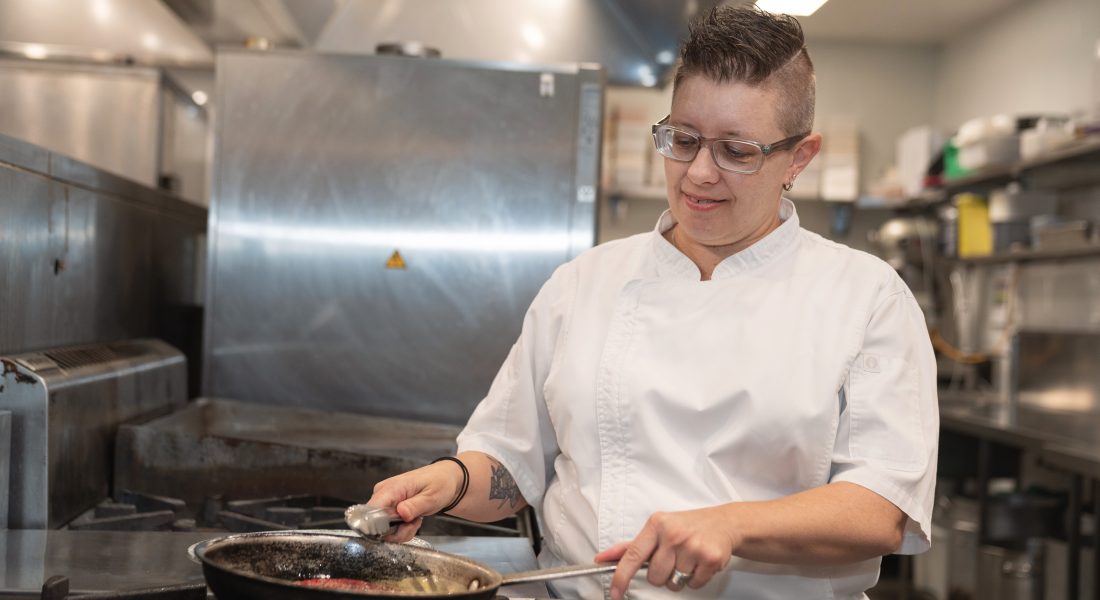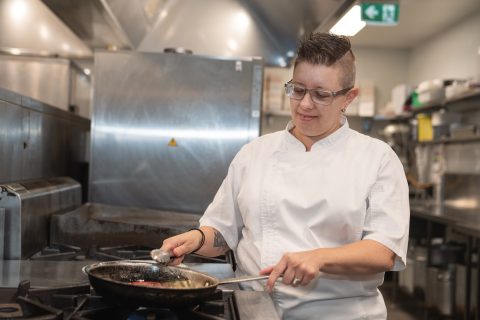SIT20421 Certificate II in Cookery
Learn how to cook to a commercial standard with the SIT20421 Certificate II in Cookery. This course teaches you proper food preparation and cookery skills across a broad range of dishes and cuisines, from preparing simple sandwiches to appetisers and salads. It provides a pathway to work in kitchens and commercial establishments.
This course equips you with the training needed to handle limited and defined responsibilities in a commercial kitchen or catering business under supervision. You’ll learn the fundamental rules of cooking and working effectively in a restaurant kitchen. Apply for the SIT20421 Certificate II in Cookery at CTA Training today to launch your professional cooking career!
SIT30821 Certificate III in Commercial Cookery
Every aspiring professional chef should study the SIT30821 Certificate III in Commercial Cookery. This qualification is designed to provide the necessary skills and knowledge for becoming a chef. With 20 core units and 5 elective units, you’ll learn how to prepare a whole range of dishes and work effectively as part of a commercial team.
The Certificate III in Commercial Cookery covers every fundamental aspect of working in a commercial kitchen. The course is designed to train chefs to a high standard with the expectation that they can work unsupervised in a variety of vibrant hospitality establishments. Apply now for a SIT30821 Certificate III in Commercial Cookery with CTA Training today!
SIT40521 Certificate IV in Kitchen Management
The Cert 4 in Kitchen Management course aims to deliver the technical skills and advanced knowledge that chefs require to manage and lead kitchens. The course covers various commercial kitchen management topics, including preparing dishes, maintaining food safety, costing dishes and menus, kitchen finances, managing conflict, rostering staff and leading people. Upon completion of this qualification, students will have the skills and knowledge to work as a Chef de Partie, Chef, Kitchen manager or Kitchen Supervisor.
Who Can Benefit from a Commercial Cookery Certificate?
If you’re passionate about food and want to start a career in the culinary arts, a commercial cookery certificate can be your gateway. Whether it’s Certificate II, III, or IV, these qualifications provide foundational skills and advanced techniques necessary to work in various culinary settings such as restaurants, cafes, and hotels.
For those already working in the hospitality industry, obtaining a commercial cookery certificate can open new career pathways. It can help transition from front-of-house roles like serving and bartending to back-of-house positions, enhancing your skill set and making you more versatile in the industry.
Even seasoned professionals can benefit from formal qualifications. Advanced certificates offer opportunities to refine your skills, learn new techniques, and stay updated with industry standards. These credentials can also pave the way for leadership roles in the kitchen, such as head chef or kitchen manager.
If you’re unsure about your career path but have an interest in the culinary arts, a commercial cookery certificate can provide practical skills and job opportunities. With diverse prospects ranging from local restaurants to international hotels and cruise ships, this certification can be the first step toward a fulfilling career in hospitality.
If you’re considering a career change, the hospitality industry offers a dynamic and rewarding environment. A commercial cookery certificate can help you gain the necessary skills and knowledge to make a successful transition into a new and exciting field.
Funding Options & Eligibility
CTA offers several different funding options to students in Queensland. To find out what funding streams you are eligible for, simply view the ‘Funding’ section within the qualification page you are interested in.

Trusted by over 250,000 Australian Hospitality Workers
FAQs
Commercial cookery refers to preparing food in a commercial setting for money, often on a large scale. Chefs working in restaurants, clubs and hotels are considered commercial chefs.
Commercial cooking takes many different forms. For instance, you could run a mobile food truck specialising in handmade burgers or work in a bakery that serves cakes, pastries, and other baked goods. Commercial cookery is simply the concept of preparing food for paying customers, regardless of where or how you cook.
The Australian Qualifications Framework (AQF) recognises a Certificate IV as more complex and sophisticated than a Certificate III. The Cert IV is designed to target more senior positions, such as managers and head chefs, while the teachings in Cert III reflect the responsibilities of those entering into the chef profession.









